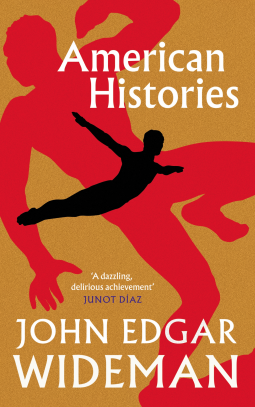
American Histories
by John Edgar Wideman
This title was previously available on NetGalley and is now archived.
Send NetGalley books directly to your Kindle or Kindle app
1
To read on a Kindle or Kindle app, please add kindle@netgalley.com as an approved email address to receive files in your Amazon account. Click here for step-by-step instructions.
2
Also find your Kindle email address within your Amazon account, and enter it here.
Pub Date 3 May 2018 | Archive Date 3 May 2018
Talking about this book? Use #AmericanHistories #NetGalley. More hashtag tips!
Description
In this new short story collection, John Edgar Wideman takes the reader from the historical to the imaginary, the personal to the political, with a cast of real and fictional characters as diverse as Frederick Douglass, Jean-Michel Basquiat and Wideman's own family.
In one story Wideman imagines a conversation between white anti-slavery crusader John Brown and black abolitionist Frederick Douglass. In another story a man sits on the edge of the Williamsburg Bridge, considering whether to jump.
American Histories is an extended meditation on family, history and loss. Emotionally precise and intellectually stimulating, this is Wideman at his best.
Available Editions
| EDITION | Hardcover |
| ISBN | 9781786892027 |
| PRICE | £15.99 (GBP) |
Average rating from 3 members
Featured Reviews
 Paromjit H, Reviewer
Paromjit H, Reviewer
Wideman writes a short story collection featuring the real and the imagined, of family, loss and history that is deeply compelling. The stories range from a mere wisp to the more substantial, often reading like a treatise on race in the US. It begins with a prefatory note to the President, imploring him to eradicate slavery, not just words found in the constitution, but the actual realities of black Americans facing this scenario today. However, it is acknowledged that it just may not be in his power to address this. What follows are a diverse range of scenarios featuring Wideman's family and characters such as John Brown, Frederick Douglass and Basquiat.
Frederick Douglass sees a different path for himself in tackling slavery from the more direct action route taken by John Brown, willing to lay down his life and places his family directly amidst the fight against slavery. There are dinner conversations on Putin, health, failure of the public schools to educate coloured boys and white cops killing unarmed black boys in Dark Matter. There is what shape the world is in, how it shapes the beginning and end of lives. The dead claimed by the war, a woman intent on keeping her baby from being born on Friday 13 June so as not to doom it further than it already will be. In Maps and Ledgers, Wideman's father kills a man, his Auntie C gets him a lawyer and his plea of self defense in successful. However, this is merely a prelude to a family avalanche of the worst to come, mapped by the author in ledgers. A botched surgery has the hospital held unaccountable. Wideman wonders how to help a writing student in her tale of race and slavery to push her out of the stereotype of powerless black women, instead hoping perhaps for her to break bad and have the racist system remorselessly challenged. There are thoughts on suicide, jazz and Williamsburg Bridge, mobs with their hands red from days of wasting black children, women and men in draft riots. Wideman celebrates those scholars who uncovered and preserved evidence of those who resisted slavery and bondage, such as Nat Turner, dying like so many, for the sin of his colour.
Wideman gives us multiple aspects, experiences and thoughts on race that define his uncompromising stance on slavery and the black experience of life in American history and its present. He is radical in his perspective, with a wealth of evidence to back up his stance. Many may well find his thinking unsettling, disturbing and uncomfortable. I see him as philosophical, profound, moving, energising, amidst a history of an unforgiving, ruthless, divide and conquer, and exploitative world experienced by black Americans. The present state of the US offers little in the way of a promising future. A hard hitting and thought provoking selection of short stories from Wideman which I recommend highly. Many thanks to Canongate for an ARC.



